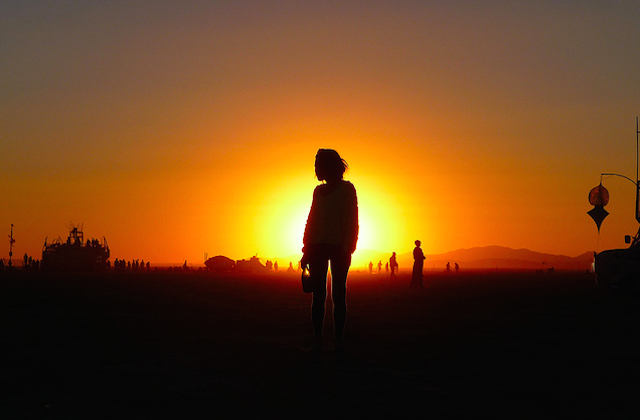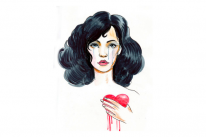
“Be yourself. Everyone else is already taken.” ~Oscar Wilde
Confession: I’m a master wallflower.
In high school, a friend and I decided to skip our dreary computer class and roam the halls instead. The following day, our crabby teacher immediately reprimanded my friend for skipping class. I sat directly next to her, giggling and rubbing it in her face.
The teacher didn’t even know my name, let alone that I had skipped his class the previous day. I rejoiced in my anonymity thinking, “It pays to be unknown.”
To an extent, it was true. My friend was so disruptive and chatty that she couldn’t avoid trouble if her life depended on it. However, I didn’t just get away with things; I missed out on things.
You can’t float through life anonymously. If you try, you’ll simply be dubbed as whatever people assume you are. (Spoiler alert: It’s usually inaccurate.) Sometimes you just have to be an active participant instead of an idle observer.
The problem for me was that my needs always felt too obscure and alternative to everyone else’s.
I attended a school where the teachers were keen on force-feeding us religious beliefs, which went against my need for tolerance and openmindedness. Thus I began to feel defensive expressing myself, assuming I’d be met with blank stares or opposition.
Stop Tiptoeing
You’d be hard-pressed to find a self-improvement resource without an encouraging reminder to “be yourself.” Why is that such a common struggle? What affects us so pervasively as we age, that remaining our “true selves” becomes a cryptic chore?
Other people. We become more and more aware of other people: what they expect, what they want, what they think.
Before you know it, that incredibly simple act of “being oneself” suddenly becomes a muddled minefield, where each person’s opinion of you is a potential explosion.
So, it’s best to just tiptoe around, right?
Not really. Being closed off is unsustainable, ineffective, and quite frankly, exhausting. It leaves you with a surplus of protection, but very little fulfillment and growth.
Consider this liberating fact: You’re allowed to need things. You don’t have to apologize. It’s an obvious but effective reminder if you find yourself neglecting your needs.
Some people only realize this after decades of failed tiptoeing, and sadly, some never realize it at all. But what does being yourself have to do with your needs? From my experience, when you don’t unveil your authentic self, you don’t get what you need.
While others will occasionally know what’s best for us before we do, we’re often far more capable of deciding what we need. No matter how intelligent or well intentioned someone is, they may not understand what’s best for you.
Assessing Your Needs
Over time, I’ve realized that one of my greatest needs is good communication. When I’m detached and don’t have a solid circle of people to confide in, I get stressed very quickly.
When our needs are fulfilled, we’re able to be who we are without restraints. Whether emotional or physical, our needs will make themselves known if we pay attention.
1. Stop right now and think of something that you need and don’t have.
It can’t be materialistic like a TV or a new purse, but something that the “real” you deeply needs. Maybe you’ve never even admitted it aloud to anyone, for fear they’d reject it or talk you out of it.
2. Now give yourself complete permission to obtain whatever it is.
If you’re anything like me, you may feel a peculiar weight being lifted from you—one that should’ve never been there in the first place.
To assess yourself, just think of the people in your life who have achieved fulfillment. If you have any negative feelings like resentment or envy towards them, you’re probably not getting what you need. Otherwise, wouldn’t you be happy for them?
Back to the Basics
It’s hard for us to be our “true” selves because our true selves are innocent and vulnerable. Nowadays, vulnerability is about as fashionable as a fanny pack collection.
We can edit photos of ourselves in Photoshop or post brief statuses about our lives that give the impression of flawlessness. We reject vulnerability in favor of impressions, making it harder for our authentic selves to emerge.
As adults, it’s easy to let fear, anger, and sadness fill the hole of our unfulfilled needs. This can throw us off course, causing us to forget the original direction we once had in our youth. Thus, it’s primarily about piecing together the fragments, and as a wise baboon named Rafiki once said, “remembering who you are.”
Being your authentic self doesn’t require you to add anything new to your life. It only requires you to subtract the things that are harmful, distracting, and unaligned with your goals.
Your ability to be yourself is proportionate to how well you know yourself. For many of us, it may require a serious assessment and difficult decisions.
In short, if your only reason for not achieving something is that other people won’t understand, that’s no reason at all. If what you want will help you grow, it’s your right and your responsibility to obtain it.
Photo by Carlos Pantoja
About Brianna Johnson
Brianna runs a depth psychology platform called Exist Better. Her School of Self is designed to help individuals graduate from mainstream groupthink, integrate painful shadow aspects, and learn how self-empowerment actually works.













 Though I run this site, it is not mine. It's ours. It's not about me. It's about us. Your stories and your wisdom are just as meaningful as mine.
Though I run this site, it is not mine. It's ours. It's not about me. It's about us. Your stories and your wisdom are just as meaningful as mine. 